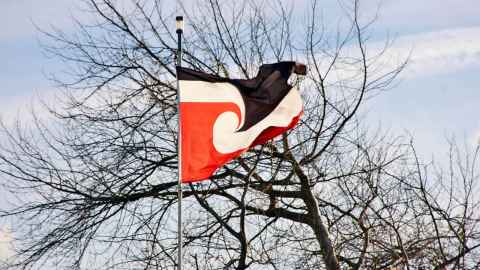The neoliberal attack on the Treaty of Waitangi
17 September 2024
Opinion: According to David Seymour, the Treaty Principles Bill is all about democracy, but the broader politics he pursues runs counter to this, argues Neal Curtis

Opinion: The Government, led by a run-of-the-mill-corporatist, a garden-variety populist and a 10-a-penny libertarian has been considering the future of a singular and unique treaty that is at the heart of what is so special about Aotearoa New Zealand. In the guise of the Treaty Principles Bill, these politicians will begin a process that could transform what is an incomparable, living document into three supposedly universally recognisable, formal principles.
According to the author of this bill, David Seymour, this is all about democracy. I’d argue the broader politics he pursues runs counter to this.
Seymour and Prime Minister Christopher Luxon (and to a lesser extent Winston Peters) subscribe to a doctrine that has for the last 45 years been known as neoliberalism. This is defined by freedom of the individual, more often cast in its consumer mode than its citizen mode, and the “rolling back of the state”.
For Seymour and Luxon this means an individual’s right to choose, which should take precedent over anything regarded good for society. It also means removing government from the market where welfare systems purportedly distort the “true” nature of economic relations, and regulation supposedly strangles businesses in a tangle of “red tape”.
To truly understand those who subscribe to this credo, we need to be clear that neoliberalism is not an economic philosophy but primarily a political philosophy justified by some seriously questionable economic theories – for instance, the efficient markets hypothesis, the theory of dynamic stochastic general equilibrium, or trickle-down economics.
When neoliberals say they want to roll back the state they really mean two things. The first is that they believe everything currently administered and owned by the state – any publicly owned service or asset – should in fact be owned by corporations and private investors. The gradual and incessant move towards privatisation registers this desire.
Without regulations, our votes mean little because the government we elect wouldn’t have any power or any leverage over an unregulated corporate sector that would be free to use, accumulate and distribute what and as it sees fit.
Second, it means the cutting of regulation that enables transparency, oversight and accountability. Isn’t it ironic, then, how much ($400,000 on contractors) Seymour is committing to his new Ministry for Regulation. In my understanding of a democracy, regulation is what allows the people to, via the government that represents them, retain some control over otherwise uncontrollable corporations.
Regulations secure our health and safety, our labour rights, our consumer rights, environmental protections and so on. Without regulations, our votes mean little because the government we elect wouldn’t have any power or any leverage over an unregulated corporate sector that would be free to use, accumulate and distribute what and as it sees fit.
The corporatist mentality is about transferring as much wealth as possible to “shareholders”, or those who are equally committed to privatisation and individualistic ideologies; landlords, lobbyists, party loyalists etc, people like them who have little need for government support, who have health insurance and well-located, well-insulated homes and no need for services such as public transport.
What works for the wider social good is irrelevant because they subscribe to the Thatcherite belief that there is no such thing as society, only individuals and their families. What is argued to be best for wider society is regularly recast as that which constrains our captains of industry whose “self-made” success, they will argue, is solely because of an innate talent that has deservedly placed them at the top and should give them licence to rule.
Exemplary of this view is Peter Thiel, the billionaire whose New Zealand citizen application was fast-tracked by the John Key administration. Thiel, who funded JD Vance’s ascendancy to the Republican Party Vice-Presidential nomination, is explicit in his opposition of democracy because he argues it is incompatible with freedom. By which we can assume he means his freedom to do whatever he wants, whenever he wants to do it.
This is the myth of the alpha male without whom society would collapse. It is an attitude endemic in Silicon Valley and is a deeply anti-social philosophy that too often finds itself, at least on social media, in the company of more overtly fascist commentary.
Neoliberalism, which has secured the growth of inequality and allowed individuals to amass more wealth than most nations, and the liberalism that underpins it, which has now morphed into this new variant of hard-right libertarianism, are engineering a society that is becoming less recognisably democratic, and much closer to the aristocracy that democracy supposedly replaced.
Democracy, if it is to mean anything, is about ensuring that those who have been excluded are included. And it’s about enabling their inclusion.
The standard criticism of liberal democracy is that it remains ludicrously formal. This means that everyone is given a right to something or freedom from something irrespective of their actual ability to take advantage of it. The gradual recognition of Te Tiriti in this country has been part of a political effort to substantially address the historical and persistent issues of colonialism, and it is this attention to making a substantial difference that Seymour appears to find objectionable.
Dr Neal Curtis is professor of Media and Communication, Faculty of Arts
This article reflects the opinion of the author and not necessarily the views of Waipapa Taumata Rau University of Auckland.
This article was first published on Newsroom, The neoliberal attack on the Treaty of Waitangi, 17 September, 2024
Media contact
Margo White I Research communications editor
Mob 021 926 408
Email margo.white@auckland.ac.nz